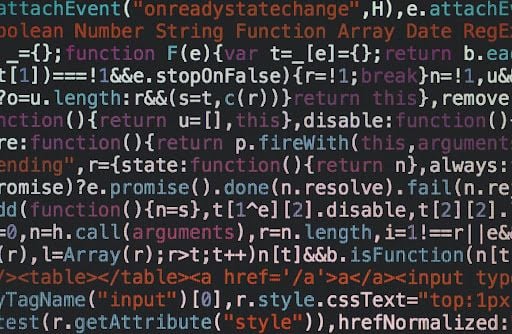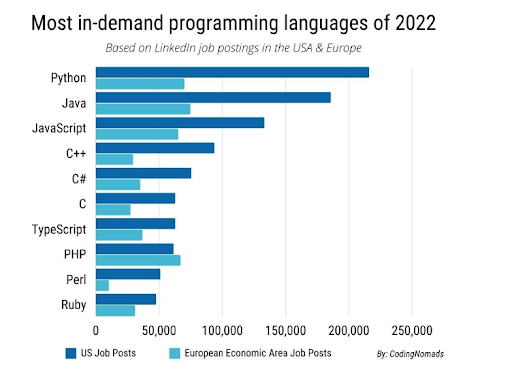There are a lot of misconceptions related to careers in programming and software development, usually perpetuated by those unfamiliar with programming. To make matters worse, sometimes these myths are enough to derail someone’s intentions of becoming a programmer.
So let’s debunk 10 common misconceptions related to programming and software development.
10 Myths About Programming and Software Development
- You have to be good at math to learn programming.
- It takes months to perfect programming.
- You need a 150+ IQ to be a programmer.
- You need to have a college degree.
- A college degree is a waste of time.
- Programmers won’t have jobs soon.
- There’s too much to remember.
- Typical programming code is indecipherable.
- Python is not a real language.
- Real programmers use C or C++.
Myth 1: You Have to Be Good at Math
Fact: You don’t need to be good at math to become a programmer.
To be honest, you don’t really need to know math at all to get started. However, mathematical thinking can help as you’re starting out. For example, programming uses functions that behave similarly to functions in mathematics. They take an input and return an output.
That said, some areas in software development, such as data science or game development, heavily rely on math so, in these areas, you should be good at math!
If you are interested in programming but don’t have a mathematical background, just start experimenting!
Myth 2: It Takes Months to Perfect Programming
Fact: You will never perfect programming.
Learning programming takes a long time. It requires a lot of patience. You’re always going to learn something new, no matter how experienced you are.
Perfecting programming is not hard, it is impossible.
Make sure to accept this fact before you get started as a programmer.
Myth 3: You Need a 150+ IQ
Fact: Programming isn’t hard, but learning anything takes time.
If you expect to become a professional software developer in a matter of weeks, you won’t. In reality, it usually takes weeks — months even — just to be able to independently write a very basic program, such as a snake game.
Once you accept the fact that learning takes time, programming doesn’t feel so difficult anymore.
Myth 4: You Need to Have a College Degree
Fact: You can become a self-taught software developer without a four-year degree.
Programming is one of those skills where formal education is not a must. You can teach yourself to become a great programmer by:
- Watching (or reading) tutorials
- Joining online courses
- Joining bootcamps
- Joining online communities
- Building your own projects
When it comes to looking for a job, you don’t need to be a certified developer. Instead, you need to have a lot of skills and passion.
In my opinion, having a candidate demonstrate their expertise with a bunch of cool projects is more impressive than a degree without any projects.
Myth 5: A College Degree Is a Waste of Time
Fact: While a college degree isn’t strictly necessary, it can help.
The pros of having a degree include:
- Universities and colleges can offer great networking opportunities. It could be where you meet your future colleagues or co-founders.
- You have professors who can mentor you and guide you in the right direction.
- College courses set the pace, which can be helpful if you’re not great at self study or self-paced learning.
- Help is constantly available.
- You learn about a variety of fields in computer science.
- A degree can’t be taken away from you.
So, while university education isn’t for everyone, college degrees aren’t a waste of time. They can be really beneficial for some!
Myth 6: Programmers Won’t Have Jobs Soon
Fact: Programmers will continue to have jobs.
In fact, the demand for software developers is growing constantly.
These days, almost all businesses are also online businesses. This means almost every company needs a developer to take care of their e-commerce platform.
However, due to rapid developments in AI, it is indeed unclear what the future holds for us programmers. However, if AI were to replace programmers, it would probably be advanced enough to replace all other jobs, too. So don’t worry . . .yet.
Myth 7: There’s Too Much to Remember
Fact: You don’t need to know how to program by heart.
Instead, it’s enough to understand the basic ideology of programming.
If you learn multiple programming languages over time, you’ll realize how hard it is to remember the syntax of each one. This is because each programming language has some similarities to every other programming language. It’s impossible for you to remember everything.
Instead, it is way more efficient for you to learn the basics of coding, and use Google when you need to.
Myth 8: Typical Programming Code Looks Like This . . .

Fact: Code never looks like that.
This code is illegible and it’s not feasible to manage. Usually, program code is structured and readable like this:

If you look at this piece of code, there is way less going on. More importantly, it’s clearly structured and at least partially reads like English.
A good piece of code is something that makes the programmer’s intent clear while being easy to read and manage. No developer wants to spend extra time reading a verbose piece of code.
Myth 9: Python Is Not a Real Language
Fact: Python is a language just like any other.
As a matter of fact, Python is one of the most popular programming languages and the most in-demand language in 2021–2022.
Better yet, Python is also one of the most versatile languages, which means it can be used in many areas of software development, such as:
- Game development
- Web development
- Data science
- The list goes on . . .
Due to the versatility and the simple English-like syntax, experts often recommend Python as the first programming language to learn.
Myth 10: Real Programmers Use C or C++
Fact: all languages are valid and in high demand.
Learning C or C++ is indeed way harder than learning Python, but the fact that a language is challenging doesn’t mean it’s somehow more valuable. That would be like saying badminton isn’t a sport because it’s easier to learn than tennis. (I don’t know if that’s true or not; don’t @ me.)
That said, while Python is easier to learn, that means there’s more competition on the job market.
Any way you slice it, C, C++ and Python are valuable skills that are all in high demand.

Whatever language you choose to learn, the learning curve will be steep, and the competition will be tough.
Bonus Myth: Asking for Help Is Embarrassing
Fact: Asking for help is essential to being an effective developer.
Sometimes asking for help will be the only way to overcome the obstacles hindering your process.
There are so many things to remember in programming that it’s not feasible to do it all on your own.
This is why there are huge communities built around different areas of software development. They’re there to crowdsource solutions and help one another. If there’s an error in your code, mull it over for a minute or two. If nothing comes to mind then, when all else fails, Google up the error to search for help.
It would be inefficient to develop software without asking for help and trying to figure out everything yourself. If you’re working as a software developer, you should always be able to ask for help from those who are more experienced.
In my opinion, a skillful developer is someone who knows to ask for help early to maximize progress — and who isn’t ashamed to use Google at work . . .
Happy coding!





